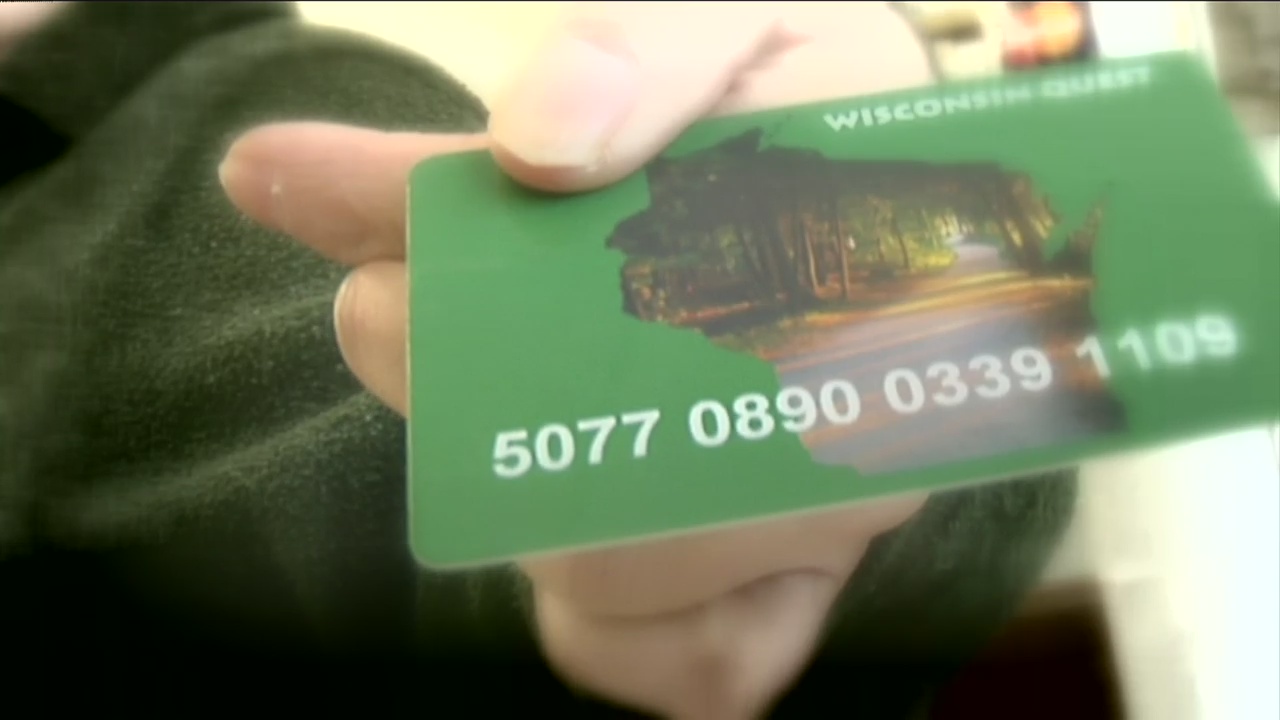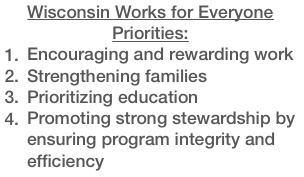
**April 6, 2017: Update **
The Joint Finance Committee has scrapped all non-fiscal policy items from the Governor’s budget proposal, including many items described in this piece. Read more about the latest move out of the budget committee here. In the below piece, any policy items with an asterisk beside them are now struck from the budget and may be introduced as separate bills.
March 23, 2017
By Ola Lisowski
MacIver Institute Research Associate
Wisconsin Works for Everyone touts four initiatives:
- Encouraging and rewarding work by helping Wisconsinites move towards self-sufficiency
- Strengthening families by supporting parents and positive norms
- Investing in success by prioritizing education
- Practicing good stewardship by enhancing program integrity and effectiveness.
Rewarding Work – Helping Wisconsinites Move Towards Self-Sufficiency
A cornerstone provision of the plan is the expansion of the FoodShare Employment and Training (FSET) program, both through requiring new portions of the population to enroll and by increasing voluntary referrals.
The reforms are a massive new expansion to the FSET program and a key portion of Walker’s hopes for his legacy as a welfare reformer.
“I want to look back and say I’ve done everything in my power to make sure those who are able to work — are able to,” Walker said earlier this month in an interview with the Washington Examiner.
Currently, only able-bodied adults without dependents who receive FoodShare benefits are required to participate if they do not work or receive job training 80 hours per month. Walker’s proposal would also require able-bodied adults with children above the age of six and who don’t work or attend job training 80 hours per month to participate in FSET. That’s a considerable change, and one which should attract some attention once the budget process gets moving.

Another provision would require parents who receive FoodShare benefits to comply with child support orders. If an individual refuses to assist in establishing paternity, or refuses to provide child support when ordered by a court to do so, they would no longer be allowed to receive FoodShare. That’s part of a change that the Walker team hopes will encourage both custodial and noncustodial parents to do the right thing.
In a similar vein, Walker’s plan expands Learnfare requirements that sanction parents whose children don’t attend school. Under current law, an individual’s public benefits may be sanctioned if they have children between ages six and 17 who are not enrolled in school. If passed, the proposal included in the budget would expand those sanctions to the parents of children who are habitually truant and who do not cooperate with case management services to improve student attendance.
For the following provisions, half of the funding allocated is from General Purpose Revenue (GPR), and the other half is federal money.
- $30 million across the biennium to refer all eligible able-bodied adult FoodShare recipients to FSET. These referrals would include people who are not currently required to meet the 80 hour per month work requirement, such as people with children up to age 18 and those who care for incapacitated persons.
- $8.5 million total and 1.5 full time positions across the biennium to create a pilot program mandating that certain able-bodied adults with dependents participate in FSET if they are not meeting work requirements. Able-bodied adults with children over the age of six would be required to participate in FSET. Included in that funding would be money to drug screen, test, and treat those participants. The state anticipates an increased enrollment of 25,000 people per year as a result of these changes.
- $945,600 and 0.90 full time positions to make FoodShare eligibility contingent on cooperating with child support orders. If any individual refuses to fully cooperate with good faith efforts to establish paternity or provide child support to a child under the age of 18, that person would be made ineligible to receive FoodShare.
- $19.7 million and 24 positions to institute a requirement that individuals who are unemployed or underemployed participate in employment and training services. This requirement would also be extended to childless adult Medicaid participants, pending the approval of a federal waiver, as well as to able-bodied adults who receive housing vouchers.
- $1.1 million to create a new five-county child support program to help noncustodial parents increase their earnings and child support payments.
- $4.1 million to the Medical Assistance Purchase Program (MAPP) to require that program participants prove gainful employment and earned income to DHS by providing tax filing documentation. Benefits would also be extended to create a “ramp” rather than a “cliff” so that participants slowly receive fewer benefits as income rises, rather than immediately becoming ineligible when their income reaches a certain point. Welfare “cliffs” such as this exist in a variety of government programs and can often create the unintended consequence of keeping individuals on public benefits programs for longer than they prefer. By creating a ramp, the state is hoping that program enrollment will slowly decline as individuals are able to “wean” off of public benefits and support themselves solely with earnings from their own jobs.
The next section in encouraging work focuses on helping ex-offenders integrate back into society. The largest line-item in this category is $2 million in GPR to expand the Windows to Work and Vocational Training programs, which provide job training for inmates before, during, and after their time in a correctional facility. Windows to Work, for example, provides pre- and post-release services, such as assisting ex-inmates in job searches. Another $1.1 million is provided through Wisconsin Fast Forward to fund two new mobile classrooms that will provide job skills training for inmates preparing for release.
Many of these provisions focus on connecting inmates with services sooner so that they can begin creating a path to independence and self-sufficiency.
Other provisions include:
- $555,400 in GPR for the creation of a mentorship pilot program to provide inmates with volunteer citizen mentors to get matched with as they approach release. One goal of this pilot program is to help inmates establish safe and productive relationships and ideally, secure employment before leaving prison.
- **Funding for a new position at the Department of Workforce Development (DWD) to expand and streamline securing apprenticeship positions for inmates.
- $437,500 in federal Temporary Assistance for Needy Families (TANF) funding for a five-year demonstration project that would focus on noncustodial parents in Milwaukee.
- **Inmates within six months of release would be housed at county jails so that they can participate in work-release and similar employment programs.
The plan also includes a few provisions that aim to help homeless people improve their lives and build self-sufficiency. $1 million in TANF funding is included to establish a grant program to ten homeless shelters to create employment-focused case management. Another provision sets up a pilot matching grant so that municipalities can deploy a van to pick up able-bodied homeless individuals and pay for them to clean up public spaces. This idea, modeled on Albuquerque’s “Better Way” project, allocates $150,000 in GPR funding.
Walker’s plan changes certain tax credits to better reward hard workers. The state’s Earned Income Tax Credit (EITC), a refundable credit for low-income families, is expanded so that parents with one child could receive up to $371, rather than the current maximum benefit of $135. This provision is anticipated to affect 131,000 filers every year and cost $20.8 million in all-funds spending. Under current law, EITC benefits for families with three children are nearly 16 times larger than the benefits for families with just one child. This change creates more equity across the tax credit and brings Wisconsin closer in line with other states.
The EITC is also expanded to a new population – noncustodial low-income parents who pay child support on time and in full. Those individuals would receive two-thirds of the benefits that custodial parents can receive, to ensure that parents without custody do not receive more benefits than parents with full custody, but also to ensure that people who are working and supporting for their families are rewarded. This provision would affect 1,100 people per year and cost $230,000 in GPR.
The Homestead Tax Credit is also modified under Walker’s proposal – benefits for the elderly and disabled would be indexed to inflation to protect those who are unable to work. At the same time, the credit is restructured for able-bodied adults in order to encourage employment. The savings from those changes would be re-invested to pay for the EITC expansion.
A brand new credit, the Young Adult Employment Assistance Credit, is created to help young adults for the first three years after aging out of foster care or those who leave the federal SSI-disabled children program. An estimated 2,000 filers would be affected each year to the tune of $724,400.
Walker’s plan also works to reduce barriers to unemployment. A brand new Occupational Licensing Review Council would offer recommendations on the elimination of current licenses, and “Sunrise Reports” would be required from the Department of Administration on any new proposed licenses.** Other provisions include:
- **A feasibility study on a program to help the long-term unemployed move to areas of better economic opportunity.
- Strengthening drug testing for new Wisconsin Works participants to help individuals overcome substance abuse barriers.
Fast Forward funds would be made available to develop new employer resource networks to increase the success of workers leaving public benefits programs.
Finally, the plan eliminates the “benefit cliff” in the Wisconsin Shares child care subsidy program. Currently, individuals lose eligibility for child care subsidies as soon as they make 200 percent of the Federal Poverty Level, making it difficult for individuals to slowly earn more money and leave public benefits programs. Rather, a sliding scale is created, so that individuals could receive $1 for every $3 earned in excess of the eligibility limit.
Still with me? Good. The next section focuses on families:
Strengthening Families – Supporting Parents and Positive Norms
The biggest line-item in this section is a provision for $7.8 million in federal TANF funding to expand the Family Foundations Home Visiting program to serve more families. The program has existed since 2011 and works to support families with children up to age five and helps them develop the skills to raise healthy children, with a particular focus on mental health and increased school readiness.
$1.5 million in GPR would create a new honeymoon period in the state EITC to eliminate the credit’s marriage penalty for the first three years a couple is married. Under the current EITC structure, a financial disincentive to marriage exists. This proposal is expected to affect 8,000 filers in tax year 2018.
Both custodial and noncustodial parents who receive FoodShare benefits would be required to cooperate with child support orders as well as any efforts to establish paternity in order to continue receiving benefits.
The Walker team also allocates over $1 million in TANF funding to promote what they call the “Success Sequence:” first graduating from high school, then getting a job, then waiting until after marriage and age 21 to have children. The Success Sequence would be incorporated into the Academic and Career Planning program, and would be the focus of a new public messaging campaign, alongside promoting the importance of fathers in the lives of their children.
Speaking of children, the next section looks at education…
Investing in Success – Prioritizing Education
The largest line-item here is for $500,000 in federal TANF money to create a new two-year performance-based grant program for schools that successfully implement creative strategies to reduce early-grade absenteeism. Another provision would allow W-2 benefits to be sanctioned for the families of children who are habitually truant and who do not cooperate with case management services aimed at improving attendance. Under current law, benefits may be sanctioned if a child is not enrolled in school, but not if that child is habitually truant.
Two new pilot programs that use parent alerts via text messaging are created under this section. One would spend nearly $100,000 in federal funding to text the parents of pre-K students in Head Start programs, and the other would spend $156,700 and add .25 full time positions to try to increase the number of high school seniors who successfully enroll in postsecondary programs. The Department of Children and Families (DCF) and the Department of Public Instruction (DPI) would be charged with creating a competitive grant process and providing access to the text messaging platform at no cost to the school districts.
The final section works to make public benefits programs more efficient:
Stewardship – Enhancing Program Efficiency and Integrity
Under the proposed plan, access to certain benefits programs would be limited to individuals with low incomes to ensure that they are used for those most truly in need. First, a $15,000 limit on the amount of business and investment losses a low- and moderate-income family can claim for tax credits. Small family farms are exempted from this provision.
$3.7 million total and 10.2 full time positions would be provided to prohibit individuals who are not elderly, blind, or disabled from receiving FoodShare benefits or child care subsidies if the individual lives in a household that has over $25,000 in liquid assets. The State of Wisconsin would have to ask for a waiver from the federal Department of Agriculture to implement this provision.
Finally, the Departments of Children and Families, Health Services, Workforce Development, and Public Instruction would be charged with conducting a new joint study on the overlap of chronic absenteeism and the use of public benefits. The goal of this provision is to examine how the state may most efficiently target services at those who need them most.
—
The Walker budget also spends $11.5 million in GPR and 2 full time positions for DWD’s workforce training grant program, called Wisconsin Fast Forward. Any of the following activities would be made eligible for Fast Forward grant funding:
- Collaborative projects among school districts, tech colleges, and local businesses to provide high school students with industry-recognized certifications in high-demand fields
- Programs that train teachers and that train individuals to become teachers
- Development of public-private partnerships that are designed to improve workforce retention
- Efforts by nonprofit organizations, institutions of higher education, and employers to increase the number of students who attain internships
- Community-based organizations for public-private partnerships to create a new nursing training program for middle and high school students
—
What do you think? With a breadth of provisions spanning several different departments, the Wisconsin Works for Everyone plan is thoroughly comprehensive. Do you have a favorite provision or section? What should the Walker team focus on more or less? Let us know in the comments and on social media! As always, make sure to follow @MacIverWisc for all your state budget news.
** indicates that the item has been removed from the budget, as of April 6, 2017.

